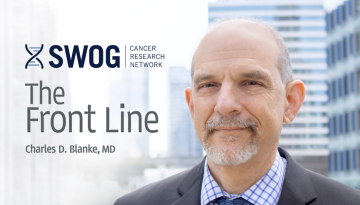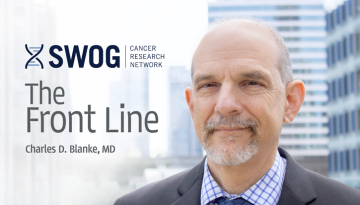Cancer Research Must Get Global
Research involving international partners is a hot-button topic right now. Francis Collins, director of the NIH, fairly recently sent a letter to thousands of U.S. research institutions expressing concerns about foreign influence on researchers. NCI director Ned Sharpless also stated NCI grantees are prime targets for international pressures. Right now, cancer research ties with China are, for good reason, rife with controversy due to allegations of influence and even espionage involving a number of high-powered U.S. universities and medical centers.
In fact, the network group chairs recently met in Washington, DC with Dr. Sharpless. We had several items of mutual interest on our agenda, and one was the mission-critical need to get global. We need to open trials in many countries, on many continents, to be successful. We need genetic diversity, patient numbers, and the mechanisms and access to screen huge populations, to complete rigorous, relevant biomarker-driven trials and prevention and epidemiology studies.
Of course, most international collaborations are above-board, transparent, and mutually beneficial. And as the nation’s largest and oldest publicly-funded cancer research network, we in the NCTN are uniquely poised to drive progress. We began in the 1950s as regional cooperatives, quickly evolved to national membership organizations, and have become somewhat successful at operating as true global networks. In the coming years, we must think more carefully about international members and collaborators, as well as the barriers to doing global clinical research.
I’m proud to say SWOG Cancer Research Network has itself made significant progress. We set our strategy to pursue an international course almost two decades ago. Today sites in six countries – Mexico, Peru, Colombia, Saudi Arabia, Korea, and Canada – are active SWOG members, with NCI trials open now to their patients. Our board of governors has approved sites in two more countries – Chile and Uruguay – for SWOG membership. Those applications now await U.S. State Department clearance. When we meet next in San Francisco, the board of governors may review other new international applications from the countries of Australia, Brazil, Israel, and Japan.
Needless to say, different countries have different reasons for wanting to work with us. Some may just wish to collaborate on one specific trial or area, instead of becoming full members. Australian investigators are interested in I-MATCH, our immunotherapy precision trial in development. Israeli investigators are interested in our burgeoning palliative and end of life care work.
In October, Dr. Lucky Lara and I traveled to Kobe, Japan to meet with investigators at the Translational Research Center for Medical Innovation, or TRI, led by Dr. Masanori Fukushima. We reviewed prior collaborations, such as the SWOG-Japan “common arm” lung studies pioneered by former group chair Dr. Charles Coltman, lung chair Dr. David Gandara, and group statistician Dr. John Crowley. We’ve been working with Dr. Tomoya Kawaguchi at Osaka City University on the molecular epidemiology of lung cancer. Dr. Christine Ambrosone’s S0424, a case-series study of NSCLC in smoking and non-smoking women and men, served as an inspiration and template for the Japan Molecular Epidemiology (JME) lung study, and researchers on both sides of the Pacific will compare and contrast results of their efforts in order to shed light into the biologic underpinnings of lung cancer in North American and Japanese patients.
This collaborative work is integral to our future. The United Nations now ranks cancer as a threat to global development, with 24.5 million cancer cases worldwide and 9.6 million deaths. Yet two-thirds of low-income countries lack even a basic National Cancer Control Plan.
I’m thrilled that the NCI has just hired Dr. Satish Gopal as the director for its Center for Global Health. I speak for the executive team when I say we’re eager to join with Dr. Gopal and others at NCI to work harder, faster, and smarter, by rolling up our sleeves and further developing our global work, improving the lives of those affected by cancer.
Other Recent Stories



